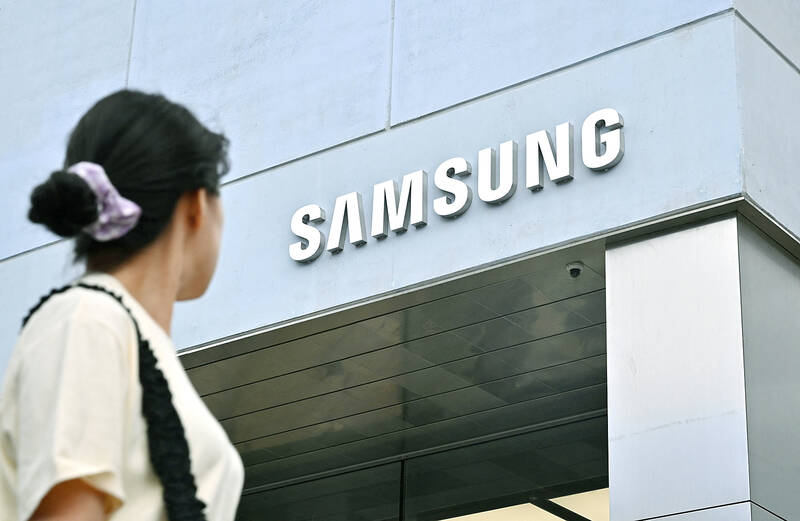Samsung Electronics Co’s chip foundry business is adding production capacity and more advanced manufacturing techniques, aiming to make gains on market leader Taiwan Semiconductor Manufacturing Co (TSMC, 台積電).
The South Korean company said that it would introduce 2-nanometer production for mobile phone parts by 2025 and expand applications.
Samsung would also significantly increase output in Pyeongtaek, South Korea, and Taylor, Texas, to shore up its foundry division, which makes chips for customers on a contract basis, the company said at a presentation on Tuesday in San Jose, California.

Photo: AFP
The world’s largest memorychip maker is looking to catch up with TSMC while also fending off a nascent challenge from Intel Corp, which is pushing into the foundry market.
While the chip industry in general is suffering from sluggish demand for mobile and personal computer parts, the artificial intelligence boom has spurred interest in advanced processors.
Samsung shared details of its 2-nanometer process technology, which would improve performance by 12 percent and power efficiency by 25 percent compared with its most advanced offering today, which is at 3 nanometers.
Like other chipmakers, Samsung is looking to geographically diversify its manufacturing footprint, which is heavily focused on East Asia.
The company, which has operated a facility in Austin for about 20 years, expects to complete the Taylor plant this year, aiming to commence operations in the second half of next year.
The expansion of production lines at Pyeongtaek along with the Taylor fab would boost Samsung’s capacity sevenfold by 2027 compared with 2021, the company said.
In addition to current chip manufacturing sites, Samsung plans to expand into a new Yongin production base.
US President Joe Biden’s administration is looking to cultivate domestic chip production with about US$50 billion in incentives. US officials have said they would give some of the funds to companies like Samsung and TSMC that are based overseas, but expanding on US soil.
Europe and Japan are also setting aside government money to foster the industry in those locations.
In the US, TSMC is building two fabs in Phoenix, Arizona, at which it is planning to make chips using its advanced 4-nanometer and 3-nanometer processes, with mass production scheduled to begin next year and in 2026 respectively.
The world’s largest contract chipmaker is also building a plant in Japan’s Kumamoto Prefecture, at which its 12-nanometer, 16-nanometer and 22-nanometer processes, as well as 28-nanometer specialty technology, would be used, with commercial production expected to start next year.
Meanwhile, a senior TSMC executive last month said that talks over a possible plant in Germany were continuing and that the earliest a decision would be made is in August.
Additional reporting by CNA and Reuters

Semiconductor shares in China surged yesterday after Reuters reported the US had ordered chipmaking giant Taiwan Semiconductor Manufacturing Co (TSMC, 台積電) to halt shipments of advanced chips to Chinese customers, which investors believe could accelerate Beijing’s self-reliance efforts. TSMC yesterday started to suspend shipments of certain sophisticated chips to some Chinese clients after receiving a letter from the US Department of Commerce imposing export restrictions on those products, Reuters reported on Sunday, citing an unnamed source. The US imposed export restrictions on TSMC’s 7-nanometer or more advanced designs, Reuters reported. Investors figured that would encourage authorities to support China’s industry and bought shares

FLEXIBLE: Taiwan can develop its own ground station equipment, and has highly competitive manufacturers and suppliers with diversified production, the MOEA said The Ministry of Economic Affairs (MOEA) yesterday disputed reports that suppliers to US-based Space Exploration Technologies Corp (SpaceX) had been asked to move production out of Taiwan. Reuters had reported on Tuesday last week that Elon Musk-owned SpaceX had asked their manufacturers to produce outside of Taiwan given geopolitical risks and that at least one Taiwanese supplier had been pushed to relocate production to Vietnam. SpaceX’s requests place a renewed focus on the contentious relationship Musk has had with Taiwan, especially after he said last year that Taiwan is an “integral part” of China, sparking sharp criticism from Taiwanese authorities. The ministry said

US President Joe Biden’s administration is racing to complete CHIPS and Science Act agreements with companies such as Intel Corp and Samsung Electronics Co, aiming to shore up one of its signature initiatives before US president-elect Donald Trump enters the White House. The US Department of Commerce has allocated more than 90 percent of the US$39 billion in grants under the act, a landmark law enacted in 2022 designed to rebuild the domestic chip industry. However, the agency has only announced one binding agreement so far. The next two months would prove critical for more than 20 companies still in the process

CHANGING JAPAN: Nvidia-powered AI services over cellular networks ‘will result in an artificial intelligence grid that runs across Japan,’ Nvidia’s Jensen Huang said Softbank Group Corp would be the first to build a supercomputer with chips using Nvidia Corp’s new Blackwell design, a demonstration of the Japanese company’s ambitions to catch up on artificial intelligence (AI). The group’s telecom unit, Softbank Corp, plans to build Japan’s most powerful AI supercomputer to support local services, it said. That computer would be based on Nvidia’s DGX B200 product, which combines computer processors with so-called AI accelerator chips. A follow-up effort will feature Grace Blackwell, a more advanced version, the company said. The announcement indicates that Softbank Group, which until early 2019 owned 4.9 percent of Nvidia, has secured a